A Comprehensive Report on Piaget's Theory of Cognitive Development
VerifiedAdded on 2022/12/14
|12
|1687
|399
Report
AI Summary
This report provides a comprehensive overview of Jean Piaget's theory of cognitive development. It begins with an introduction to cognitive psychology and Piaget's central role in the field, followed by a detailed explanation of the four stages of cognitive development: sensorimotor, pre-operational, concrete operational, and formal operational. The report then analyzes the contributions and drawbacks of Piaget's theory in relation to child development, highlighting its impact on understanding how children think differently from adults, while also acknowledging criticisms regarding the sample groups used and the theory's limited consideration of cultural factors. Furthermore, the report explores the broad applications of Piaget's theories, including its use by parents and in understanding schemas. Finally, the report examines the educational applications of Piaget's theories, focusing on developmentally appropriate education and constructivist methods of learning. The report concludes by emphasizing the influential role of Piaget's theory in understanding cognitive growth and its practical implications in education.
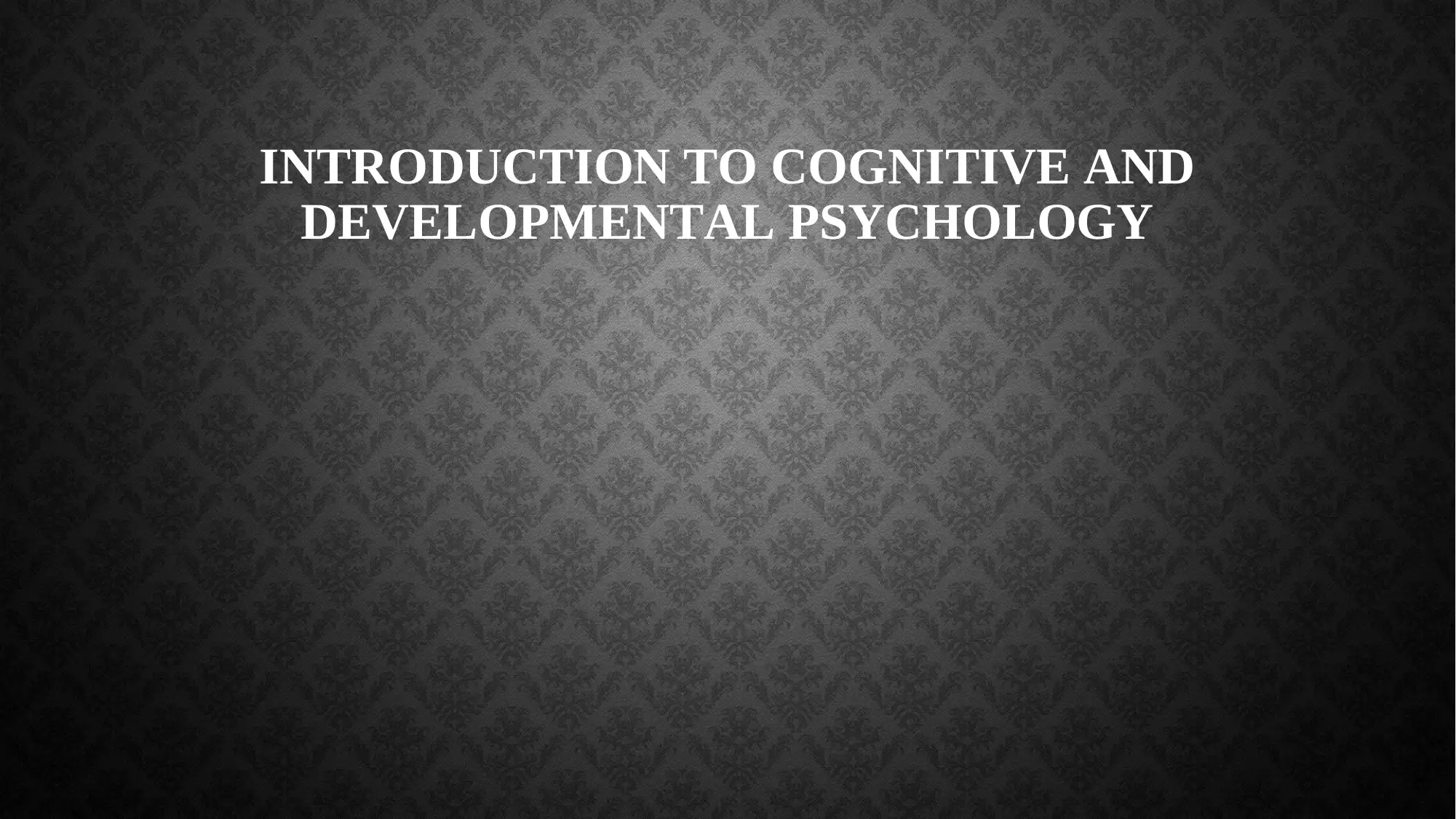
INTRODUCTION TO COGNITIVE AND
DEVELOPMENTAL PSYCHOLOGY
DEVELOPMENTAL PSYCHOLOGY
Paraphrase This Document
Need a fresh take? Get an instant paraphrase of this document with our AI Paraphraser
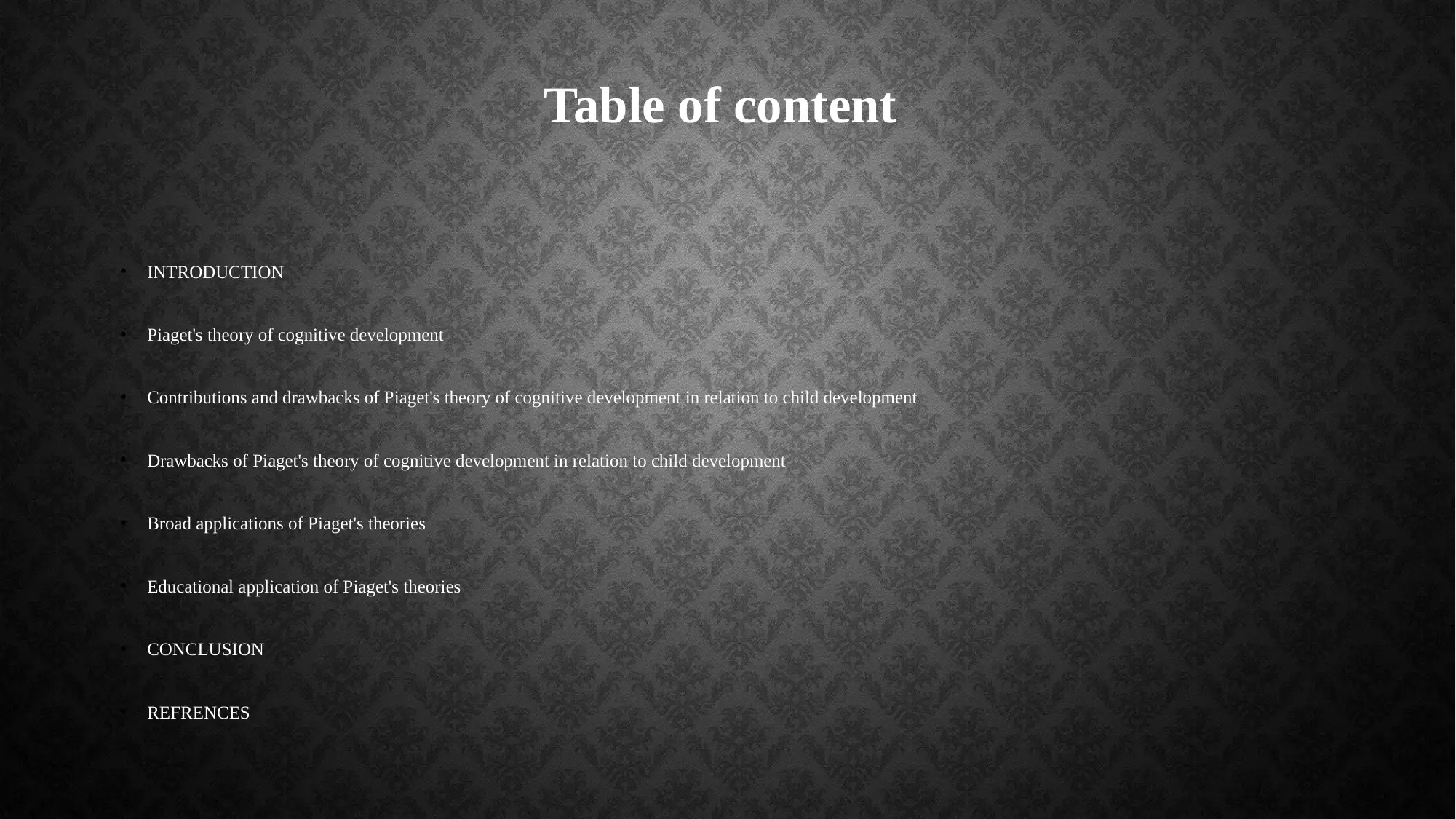
Table of content
• INTRODUCTION
• Piaget's theory of cognitive development
• Contributions and drawbacks of Piaget's theory of cognitive development in relation to child development
• Drawbacks of Piaget's theory of cognitive development in relation to child development
• Broad applications of Piaget's theories
• Educational application of Piaget's theories
• CONCLUSION
• REFRENCES
• INTRODUCTION
• Piaget's theory of cognitive development
• Contributions and drawbacks of Piaget's theory of cognitive development in relation to child development
• Drawbacks of Piaget's theory of cognitive development in relation to child development
• Broad applications of Piaget's theories
• Educational application of Piaget's theories
• CONCLUSION
• REFRENCES
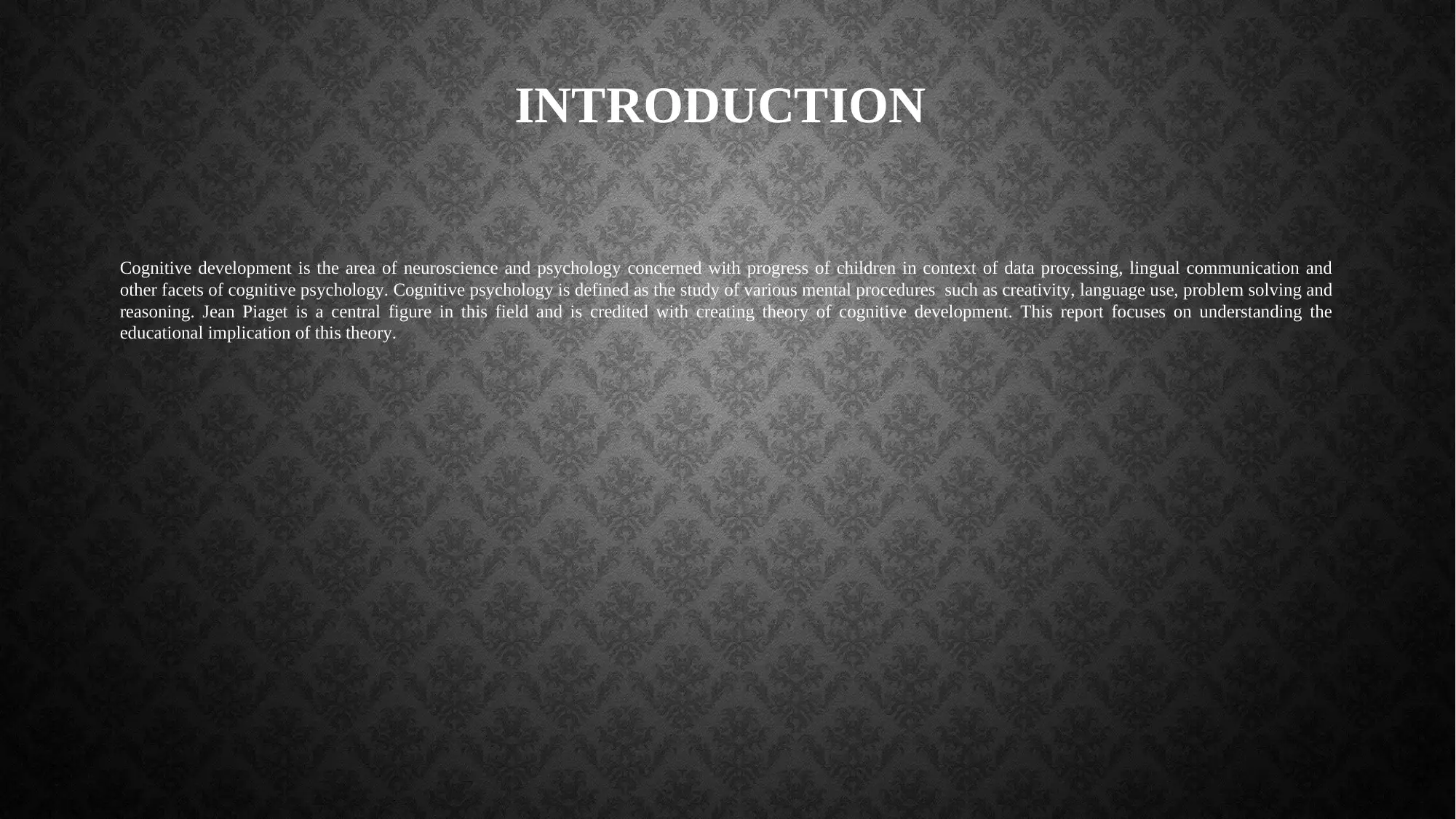
INTRODUCTION
Cognitive development is the area of neuroscience and psychology concerned with progress of children in context of data processing, lingual communication and
other facets of cognitive psychology. Cognitive psychology is defined as the study of various mental procedures such as creativity, language use, problem solving and
reasoning. Jean Piaget is a central figure in this field and is credited with creating theory of cognitive development. This report focuses on understanding the
educational implication of this theory.
Cognitive development is the area of neuroscience and psychology concerned with progress of children in context of data processing, lingual communication and
other facets of cognitive psychology. Cognitive psychology is defined as the study of various mental procedures such as creativity, language use, problem solving and
reasoning. Jean Piaget is a central figure in this field and is credited with creating theory of cognitive development. This report focuses on understanding the
educational implication of this theory.
⊘ This is a preview!⊘
Do you want full access?
Subscribe today to unlock all pages.

Trusted by 1+ million students worldwide
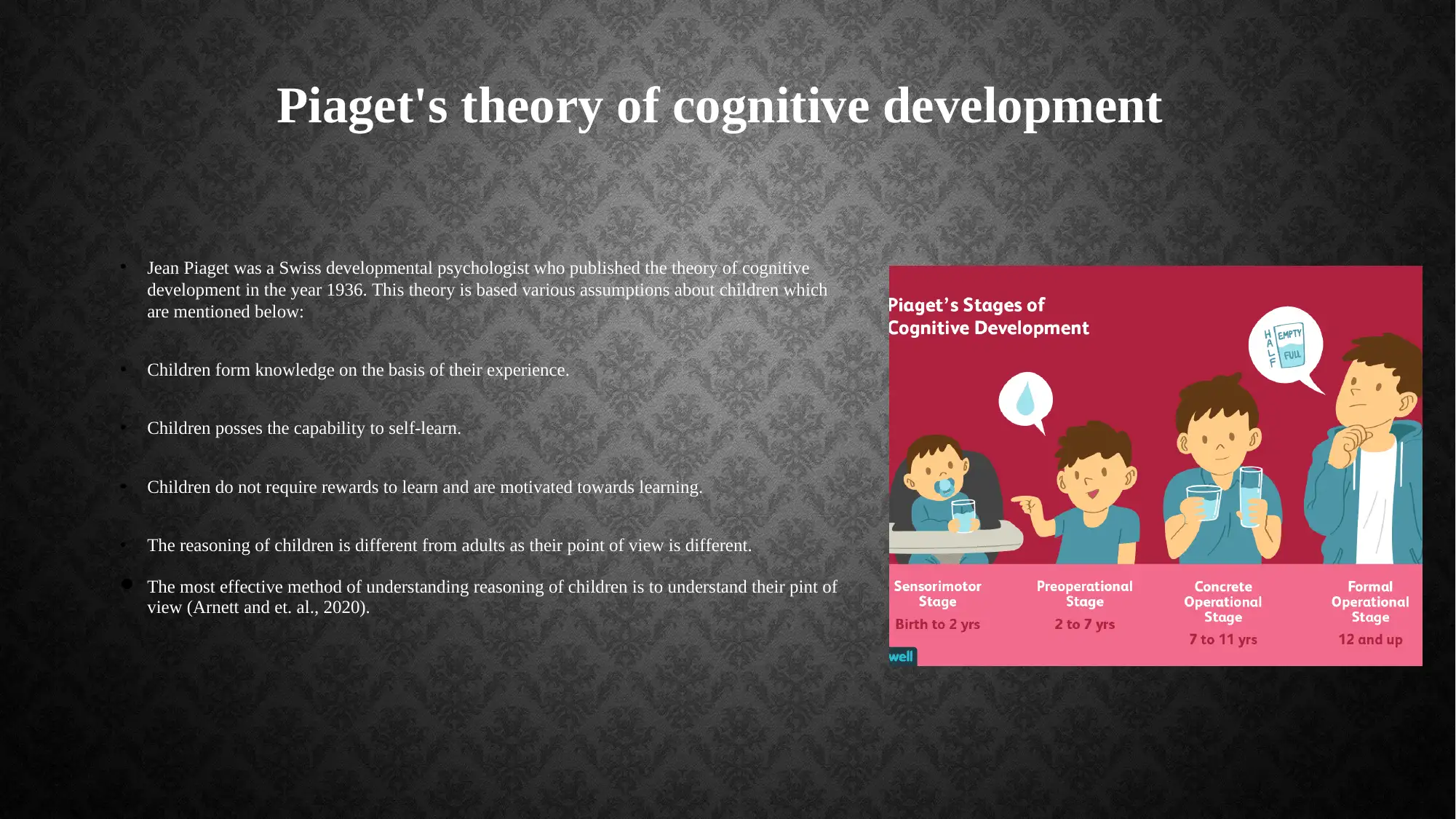
Piaget's theory of cognitive development
• Jean Piaget was a Swiss developmental psychologist who published the theory of cognitive
development in the year 1936. This theory is based various assumptions about children which
are mentioned below:
• Children form knowledge on the basis of their experience.
• Children posses the capability to self-learn.
• Children do not require rewards to learn and are motivated towards learning.
• The reasoning of children is different from adults as their point of view is different.
The most effective method of understanding reasoning of children is to understand their pint of
view (Arnett and et. al., 2020).
• Jean Piaget was a Swiss developmental psychologist who published the theory of cognitive
development in the year 1936. This theory is based various assumptions about children which
are mentioned below:
• Children form knowledge on the basis of their experience.
• Children posses the capability to self-learn.
• Children do not require rewards to learn and are motivated towards learning.
• The reasoning of children is different from adults as their point of view is different.
The most effective method of understanding reasoning of children is to understand their pint of
view (Arnett and et. al., 2020).
Paraphrase This Document
Need a fresh take? Get an instant paraphrase of this document with our AI Paraphraser
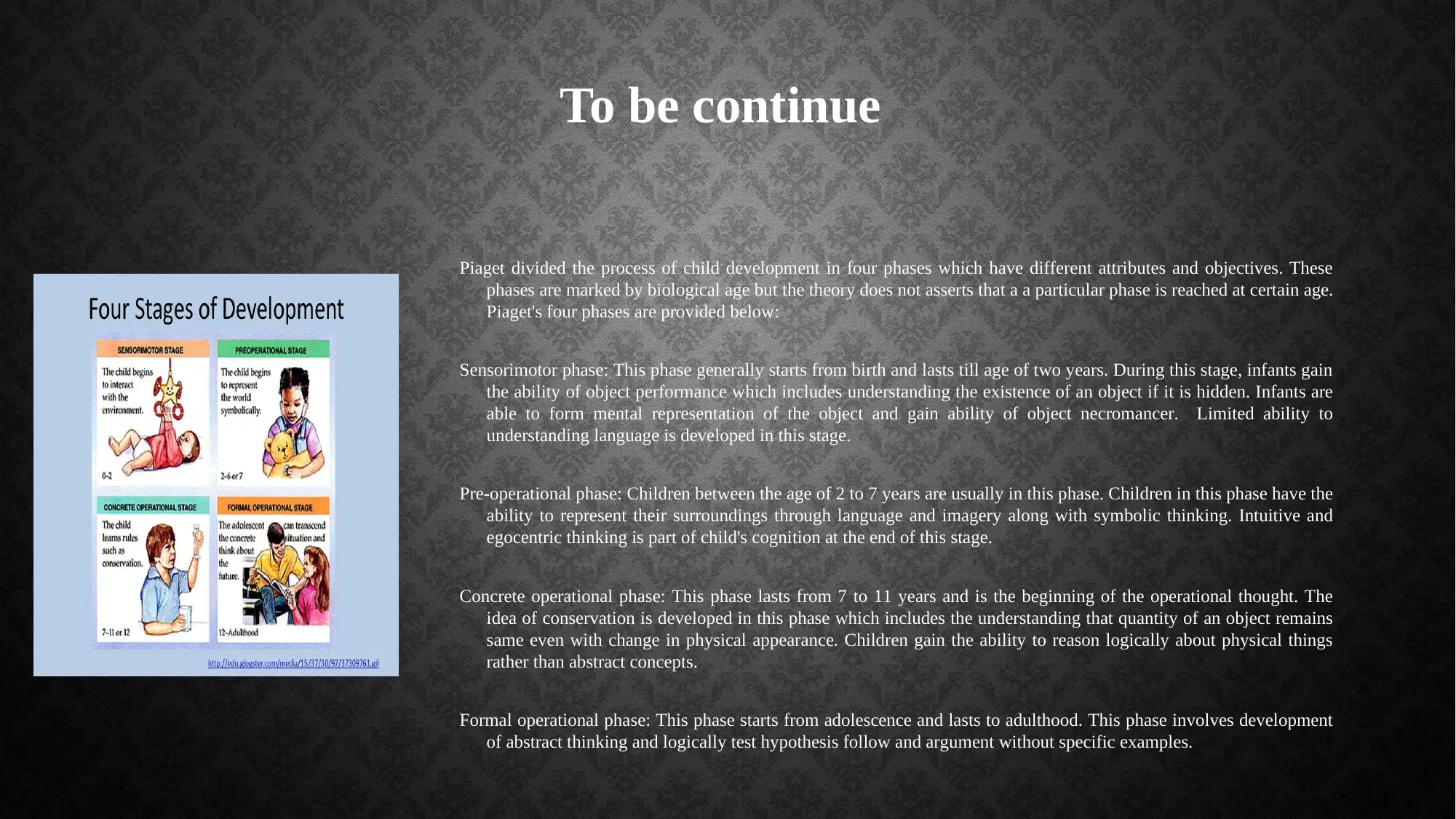
To be continue
Piaget divided the process of child development in four phases which have different attributes and objectives. These
phases are marked by biological age but the theory does not asserts that a a particular phase is reached at certain age.
Piaget's four phases are provided below:
Sensorimotor phase: This phase generally starts from birth and lasts till age of two years. During this stage, infants gain
the ability of object performance which includes understanding the existence of an object if it is hidden. Infants are
able to form mental representation of the object and gain ability of object necromancer. Limited ability to
understanding language is developed in this stage.
Pre-operational phase: Children between the age of 2 to 7 years are usually in this phase. Children in this phase have the
ability to represent their surroundings through language and imagery along with symbolic thinking. Intuitive and
egocentric thinking is part of child's cognition at the end of this stage.
Concrete operational phase: This phase lasts from 7 to 11 years and is the beginning of the operational thought. The
idea of conservation is developed in this phase which includes the understanding that quantity of an object remains
same even with change in physical appearance. Children gain the ability to reason logically about physical things
rather than abstract concepts.
Formal operational phase: This phase starts from adolescence and lasts to adulthood. This phase involves development
of abstract thinking and logically test hypothesis follow and argument without specific examples.
Piaget divided the process of child development in four phases which have different attributes and objectives. These
phases are marked by biological age but the theory does not asserts that a a particular phase is reached at certain age.
Piaget's four phases are provided below:
Sensorimotor phase: This phase generally starts from birth and lasts till age of two years. During this stage, infants gain
the ability of object performance which includes understanding the existence of an object if it is hidden. Infants are
able to form mental representation of the object and gain ability of object necromancer. Limited ability to
understanding language is developed in this stage.
Pre-operational phase: Children between the age of 2 to 7 years are usually in this phase. Children in this phase have the
ability to represent their surroundings through language and imagery along with symbolic thinking. Intuitive and
egocentric thinking is part of child's cognition at the end of this stage.
Concrete operational phase: This phase lasts from 7 to 11 years and is the beginning of the operational thought. The
idea of conservation is developed in this phase which includes the understanding that quantity of an object remains
same even with change in physical appearance. Children gain the ability to reason logically about physical things
rather than abstract concepts.
Formal operational phase: This phase starts from adolescence and lasts to adulthood. This phase involves development
of abstract thinking and logically test hypothesis follow and argument without specific examples.
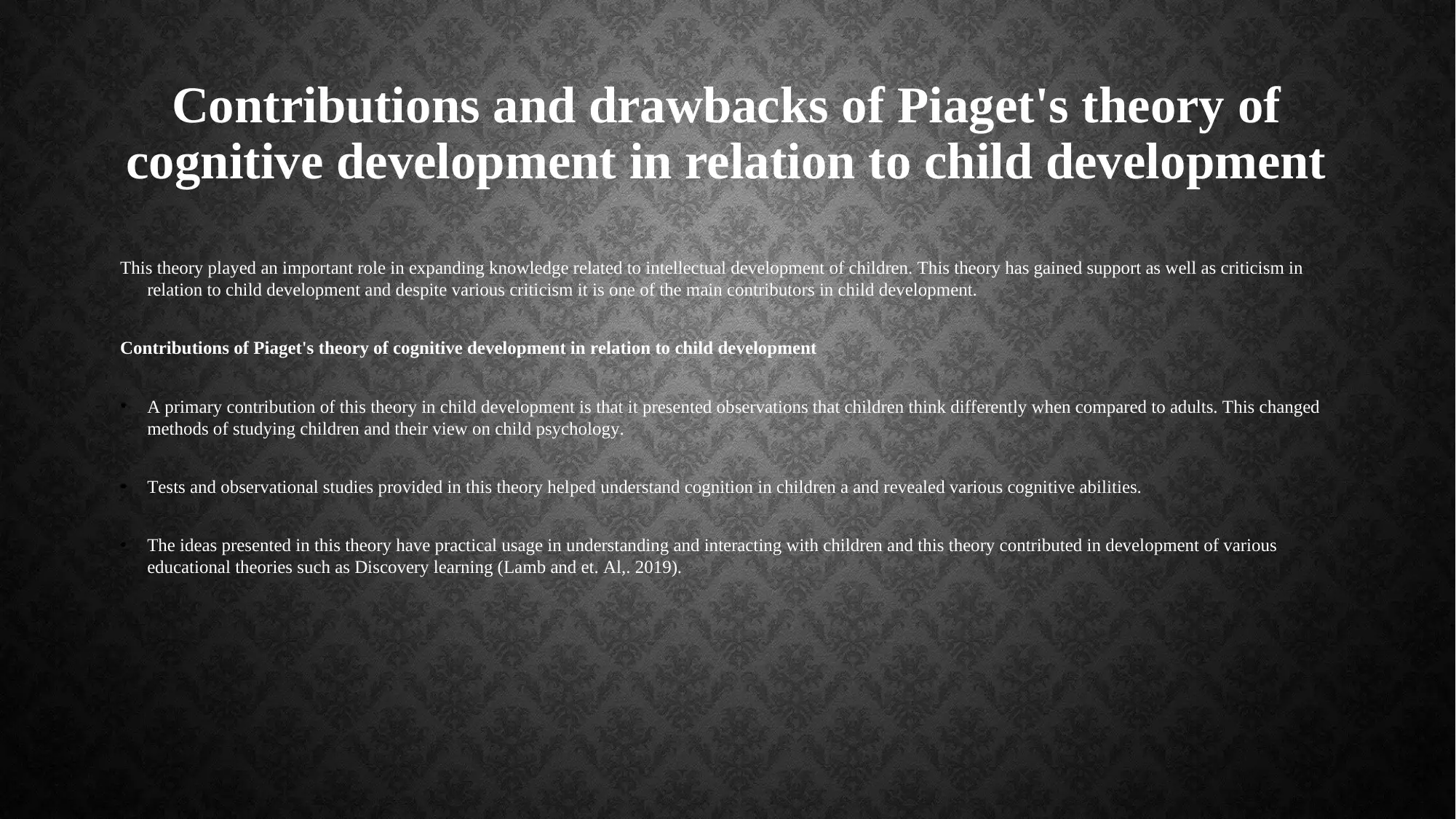
Contributions and drawbacks of Piaget's theory of
cognitive development in relation to child development
This theory played an important role in expanding knowledge related to intellectual development of children. This theory has gained support as well as criticism in
relation to child development and despite various criticism it is one of the main contributors in child development.
Contributions of Piaget's theory of cognitive development in relation to child development
• A primary contribution of this theory in child development is that it presented observations that children think differently when compared to adults. This changed
methods of studying children and their view on child psychology.
• Tests and observational studies provided in this theory helped understand cognition in children a and revealed various cognitive abilities.
• The ideas presented in this theory have practical usage in understanding and interacting with children and this theory contributed in development of various
educational theories such as Discovery learning (Lamb and et. Al,. 2019).
cognitive development in relation to child development
This theory played an important role in expanding knowledge related to intellectual development of children. This theory has gained support as well as criticism in
relation to child development and despite various criticism it is one of the main contributors in child development.
Contributions of Piaget's theory of cognitive development in relation to child development
• A primary contribution of this theory in child development is that it presented observations that children think differently when compared to adults. This changed
methods of studying children and their view on child psychology.
• Tests and observational studies provided in this theory helped understand cognition in children a and revealed various cognitive abilities.
• The ideas presented in this theory have practical usage in understanding and interacting with children and this theory contributed in development of various
educational theories such as Discovery learning (Lamb and et. Al,. 2019).
⊘ This is a preview!⊘
Do you want full access?
Subscribe today to unlock all pages.

Trusted by 1+ million students worldwide
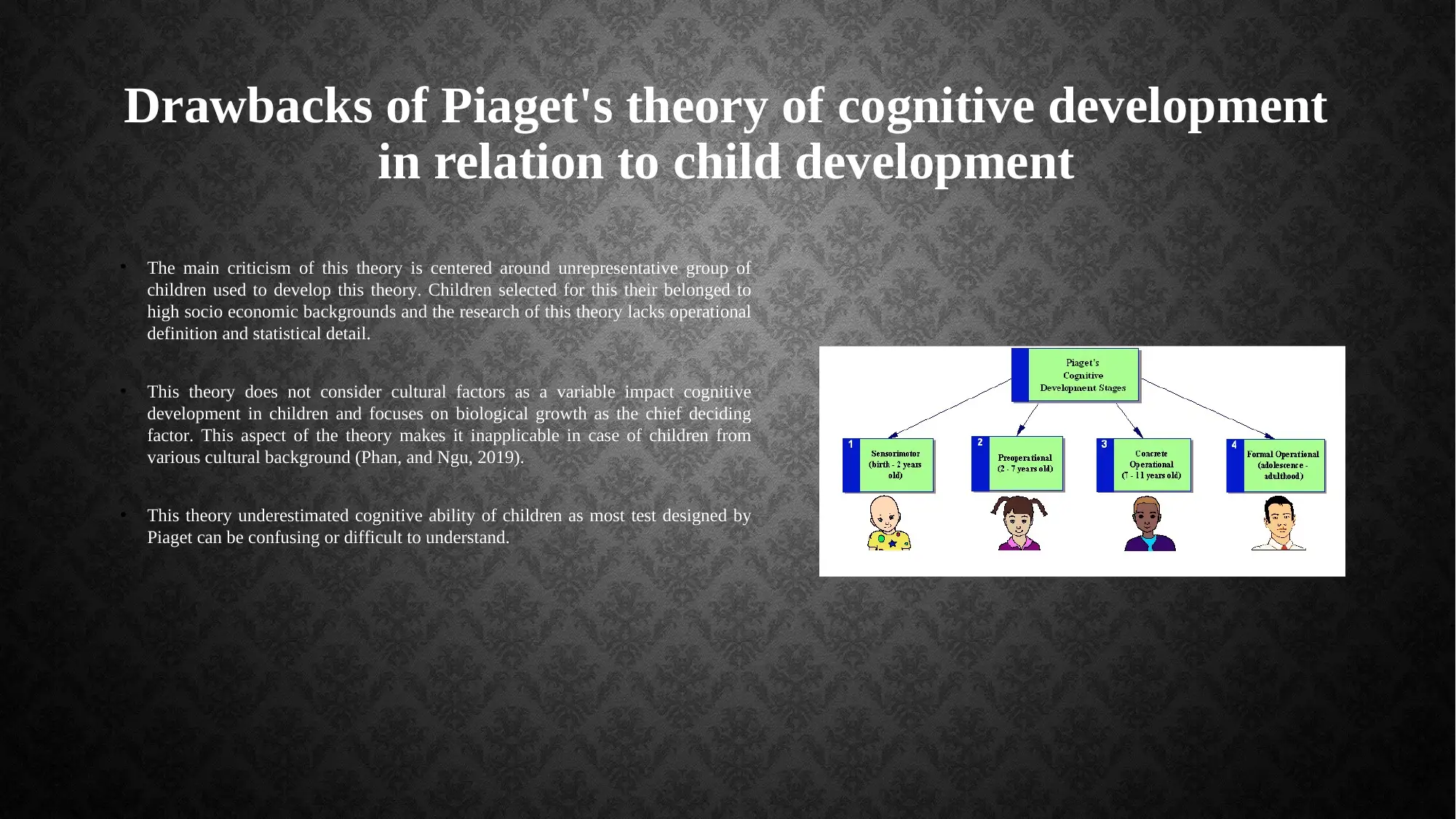
Drawbacks of Piaget's theory of cognitive development
in relation to child development
• The main criticism of this theory is centered around unrepresentative group of
children used to develop this theory. Children selected for this their belonged to
high socio economic backgrounds and the research of this theory lacks operational
definition and statistical detail.
• This theory does not consider cultural factors as a variable impact cognitive
development in children and focuses on biological growth as the chief deciding
factor. This aspect of the theory makes it inapplicable in case of children from
various cultural background (Phan, and Ngu, 2019).
• This theory underestimated cognitive ability of children as most test designed by
Piaget can be confusing or difficult to understand.
in relation to child development
• The main criticism of this theory is centered around unrepresentative group of
children used to develop this theory. Children selected for this their belonged to
high socio economic backgrounds and the research of this theory lacks operational
definition and statistical detail.
• This theory does not consider cultural factors as a variable impact cognitive
development in children and focuses on biological growth as the chief deciding
factor. This aspect of the theory makes it inapplicable in case of children from
various cultural background (Phan, and Ngu, 2019).
• This theory underestimated cognitive ability of children as most test designed by
Piaget can be confusing or difficult to understand.
Paraphrase This Document
Need a fresh take? Get an instant paraphrase of this document with our AI Paraphraser
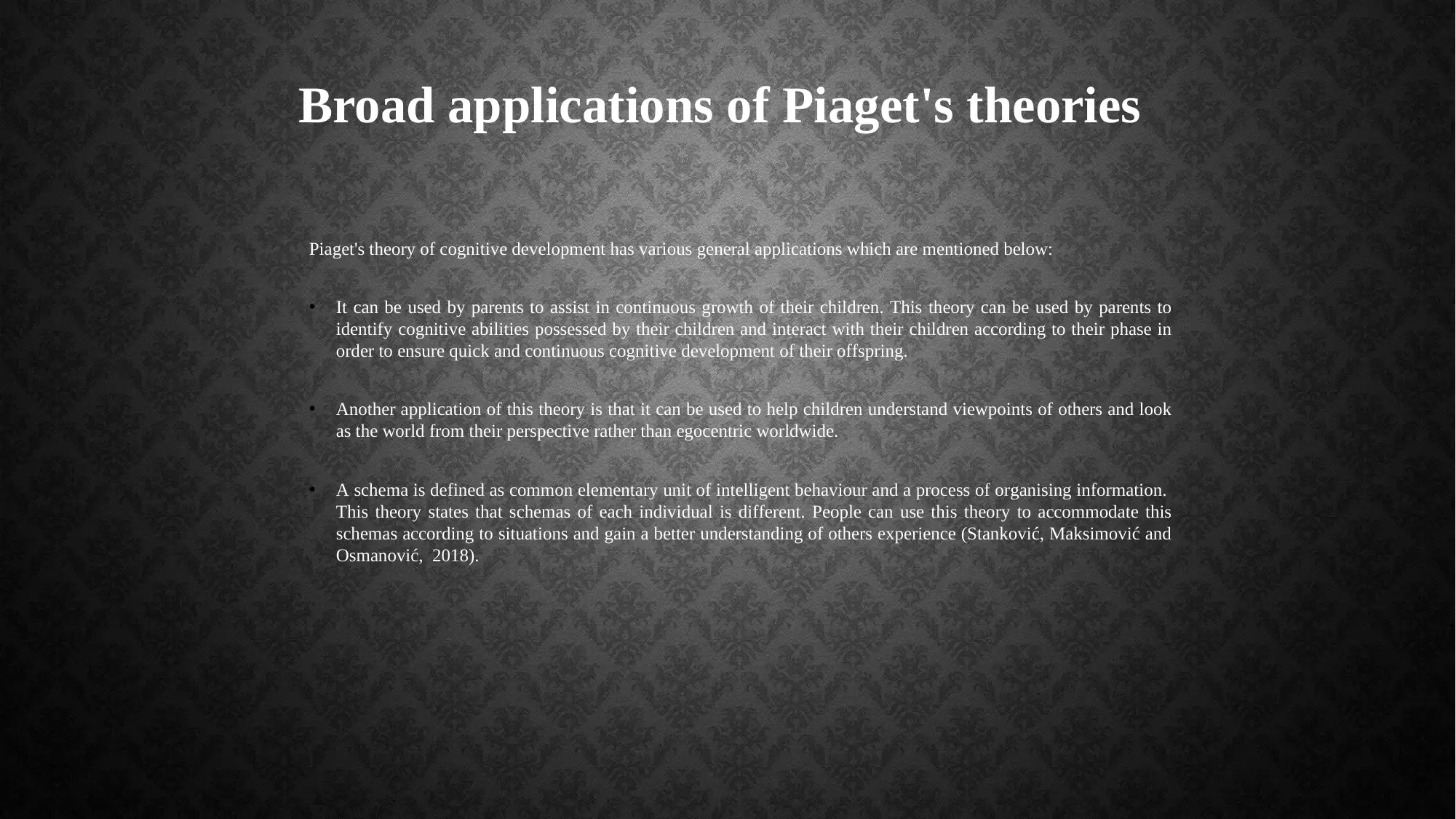
Broad applications of Piaget's theories
Piaget's theory of cognitive development has various general applications which are mentioned below:
• It can be used by parents to assist in continuous growth of their children. This theory can be used by parents to
identify cognitive abilities possessed by their children and interact with their children according to their phase in
order to ensure quick and continuous cognitive development of their offspring.
• Another application of this theory is that it can be used to help children understand viewpoints of others and look
as the world from their perspective rather than egocentric worldwide.
• A schema is defined as common elementary unit of intelligent behaviour and a process of organising information.
This theory states that schemas of each individual is different. People can use this theory to accommodate this
schemas according to situations and gain a better understanding of others experience (Stanković, Maksimović and
Osmanović, 2018).
Piaget's theory of cognitive development has various general applications which are mentioned below:
• It can be used by parents to assist in continuous growth of their children. This theory can be used by parents to
identify cognitive abilities possessed by their children and interact with their children according to their phase in
order to ensure quick and continuous cognitive development of their offspring.
• Another application of this theory is that it can be used to help children understand viewpoints of others and look
as the world from their perspective rather than egocentric worldwide.
• A schema is defined as common elementary unit of intelligent behaviour and a process of organising information.
This theory states that schemas of each individual is different. People can use this theory to accommodate this
schemas according to situations and gain a better understanding of others experience (Stanković, Maksimović and
Osmanović, 2018).
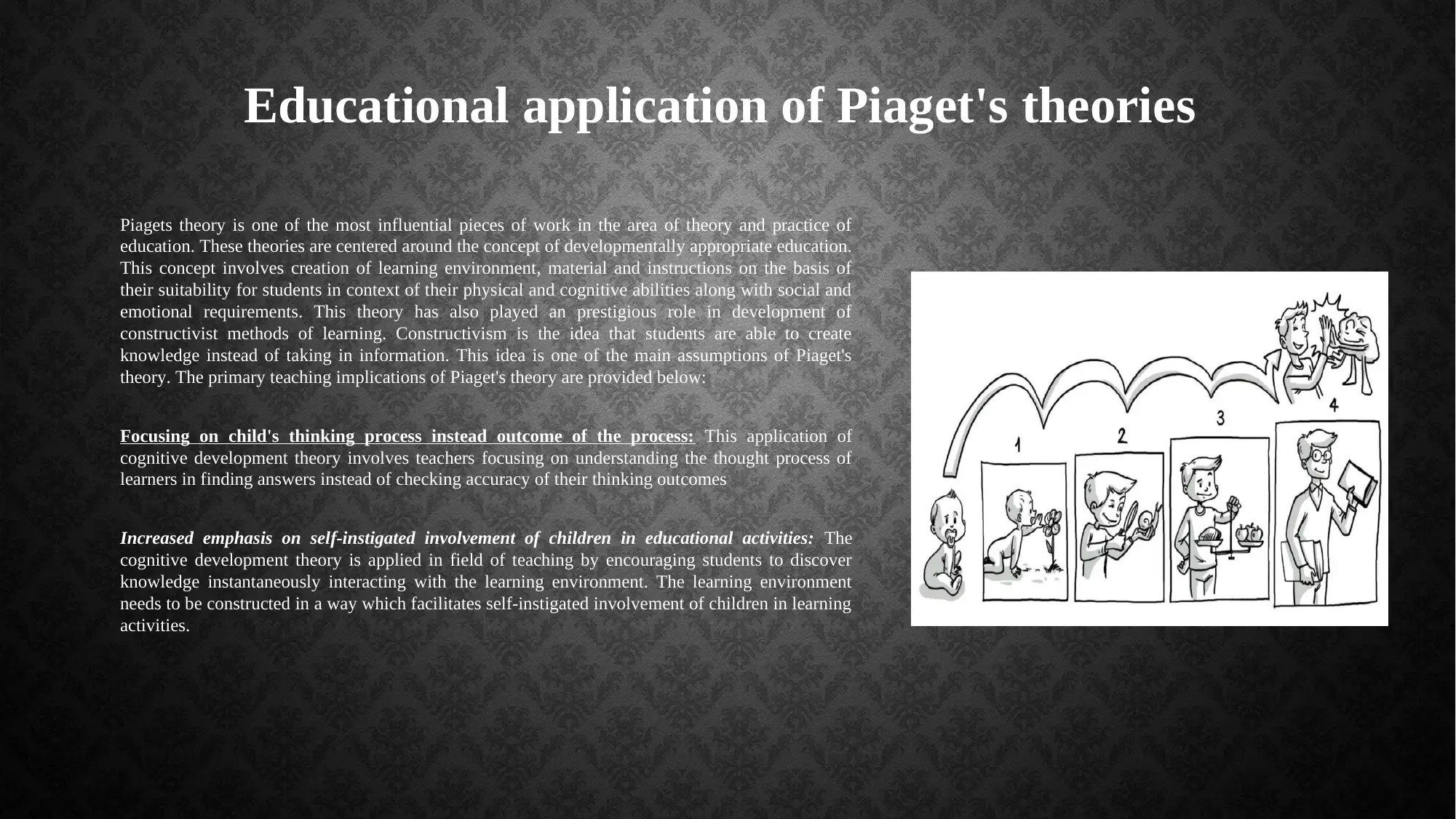
Educational application of Piaget's theories
Piagets theory is one of the most influential pieces of work in the area of theory and practice of
education. These theories are centered around the concept of developmentally appropriate education.
This concept involves creation of learning environment, material and instructions on the basis of
their suitability for students in context of their physical and cognitive abilities along with social and
emotional requirements. This theory has also played an prestigious role in development of
constructivist methods of learning. Constructivism is the idea that students are able to create
knowledge instead of taking in information. This idea is one of the main assumptions of Piaget's
theory. The primary teaching implications of Piaget's theory are provided below:
Focusing on child's thinking process instead outcome of the process: This application of
cognitive development theory involves teachers focusing on understanding the thought process of
learners in finding answers instead of checking accuracy of their thinking outcomes
Increased emphasis on self-instigated involvement of children in educational activities: The
cognitive development theory is applied in field of teaching by encouraging students to discover
knowledge instantaneously interacting with the learning environment. The learning environment
needs to be constructed in a way which facilitates self-instigated involvement of children in learning
activities.
Piagets theory is one of the most influential pieces of work in the area of theory and practice of
education. These theories are centered around the concept of developmentally appropriate education.
This concept involves creation of learning environment, material and instructions on the basis of
their suitability for students in context of their physical and cognitive abilities along with social and
emotional requirements. This theory has also played an prestigious role in development of
constructivist methods of learning. Constructivism is the idea that students are able to create
knowledge instead of taking in information. This idea is one of the main assumptions of Piaget's
theory. The primary teaching implications of Piaget's theory are provided below:
Focusing on child's thinking process instead outcome of the process: This application of
cognitive development theory involves teachers focusing on understanding the thought process of
learners in finding answers instead of checking accuracy of their thinking outcomes
Increased emphasis on self-instigated involvement of children in educational activities: The
cognitive development theory is applied in field of teaching by encouraging students to discover
knowledge instantaneously interacting with the learning environment. The learning environment
needs to be constructed in a way which facilitates self-instigated involvement of children in learning
activities.
⊘ This is a preview!⊘
Do you want full access?
Subscribe today to unlock all pages.

Trusted by 1+ million students worldwide
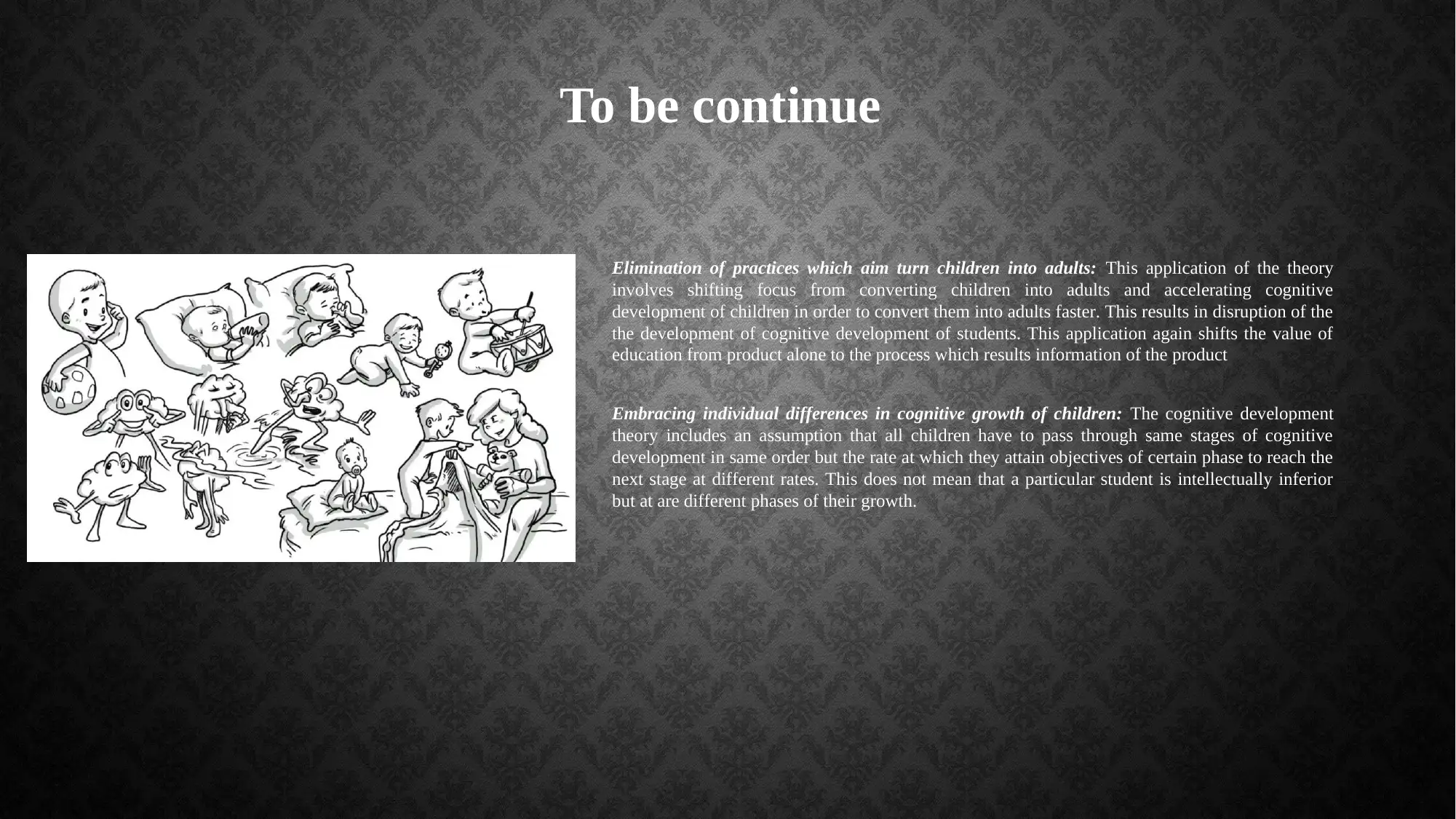
To be continue
Elimination of practices which aim turn children into adults: This application of the theory
involves shifting focus from converting children into adults and accelerating cognitive
development of children in order to convert them into adults faster. This results in disruption of the
the development of cognitive development of students. This application again shifts the value of
education from product alone to the process which results information of the product
Embracing individual differences in cognitive growth of children: The cognitive development
theory includes an assumption that all children have to pass through same stages of cognitive
development in same order but the rate at which they attain objectives of certain phase to reach the
next stage at different rates. This does not mean that a particular student is intellectually inferior
but at are different phases of their growth.
Elimination of practices which aim turn children into adults: This application of the theory
involves shifting focus from converting children into adults and accelerating cognitive
development of children in order to convert them into adults faster. This results in disruption of the
the development of cognitive development of students. This application again shifts the value of
education from product alone to the process which results information of the product
Embracing individual differences in cognitive growth of children: The cognitive development
theory includes an assumption that all children have to pass through same stages of cognitive
development in same order but the rate at which they attain objectives of certain phase to reach the
next stage at different rates. This does not mean that a particular student is intellectually inferior
but at are different phases of their growth.
Paraphrase This Document
Need a fresh take? Get an instant paraphrase of this document with our AI Paraphraser
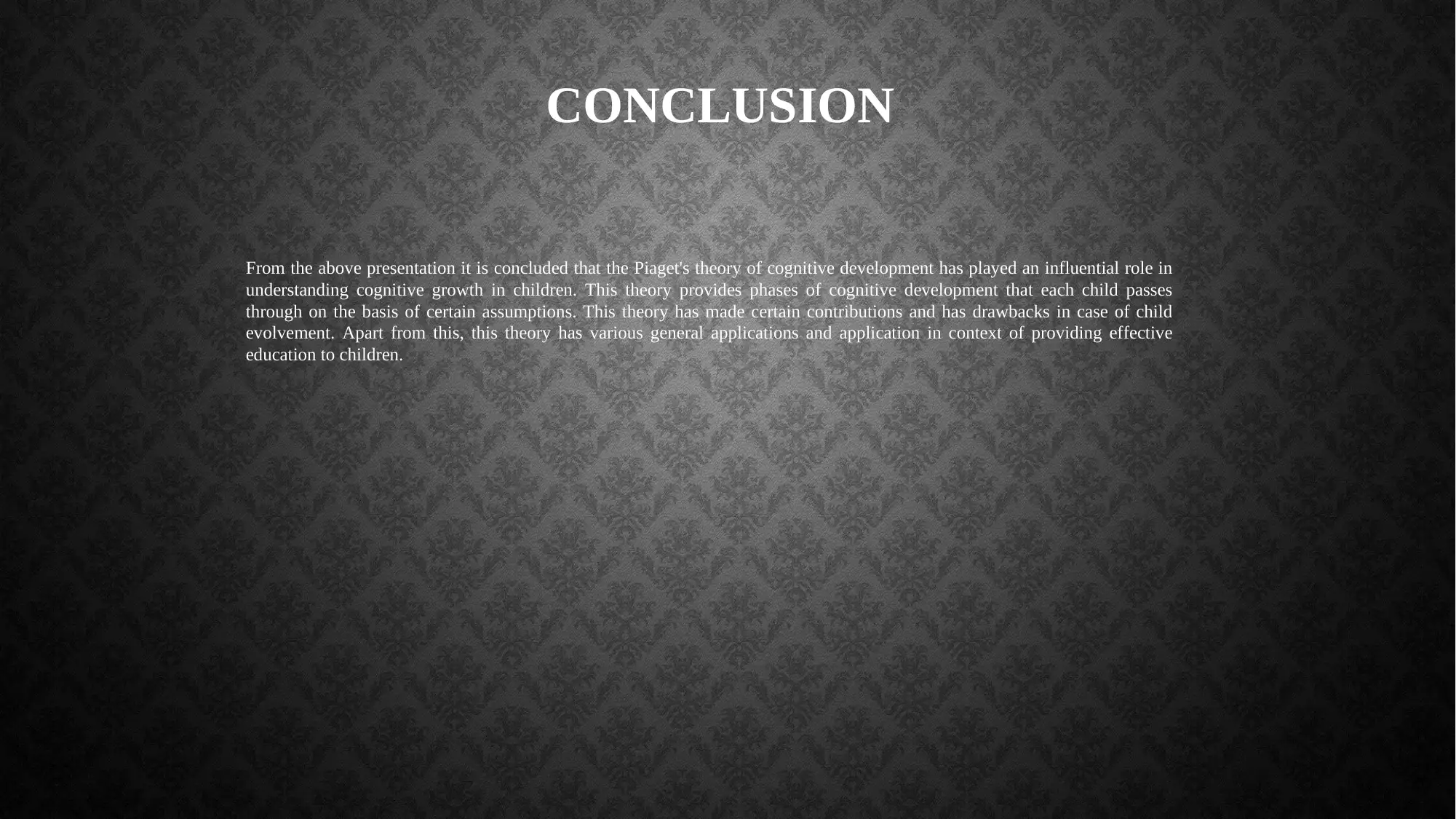
CONCLUSION
From the above presentation it is concluded that the Piaget's theory of cognitive development has played an influential role in
understanding cognitive growth in children. This theory provides phases of cognitive development that each child passes
through on the basis of certain assumptions. This theory has made certain contributions and has drawbacks in case of child
evolvement. Apart from this, this theory has various general applications and application in context of providing effective
education to children.
From the above presentation it is concluded that the Piaget's theory of cognitive development has played an influential role in
understanding cognitive growth in children. This theory provides phases of cognitive development that each child passes
through on the basis of certain assumptions. This theory has made certain contributions and has drawbacks in case of child
evolvement. Apart from this, this theory has various general applications and application in context of providing effective
education to children.
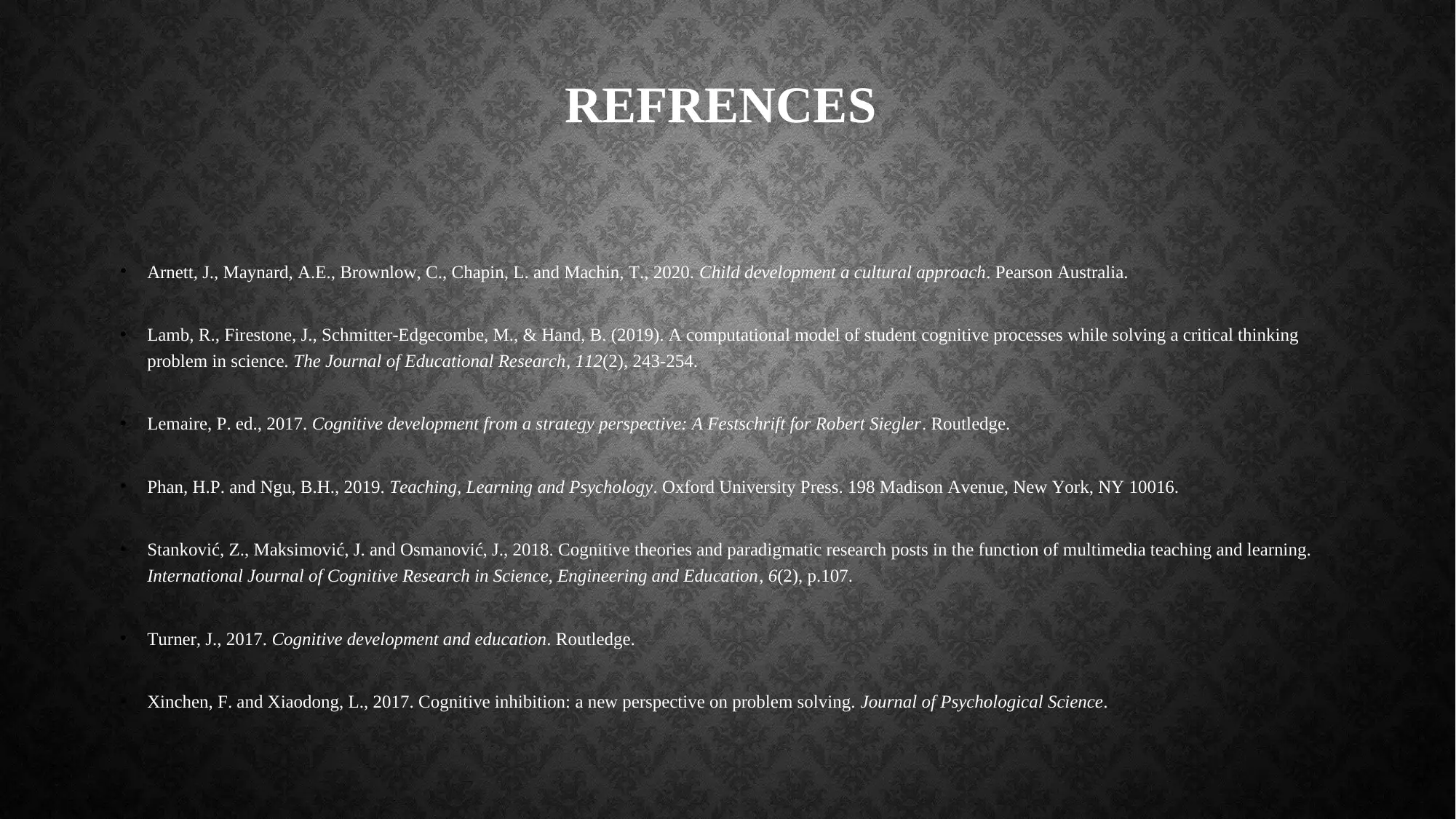
REFRENCES
• Arnett, J., Maynard, A.E., Brownlow, C., Chapin, L. and Machin, T., 2020. Child development a cultural approach. Pearson Australia.
• Lamb, R., Firestone, J., Schmitter-Edgecombe, M., & Hand, B. (2019). A computational model of student cognitive processes while solving a critical thinking
problem in science. The Journal of Educational Research, 112(2), 243-254.
• Lemaire, P. ed., 2017. Cognitive development from a strategy perspective: A Festschrift for Robert Siegler. Routledge.
• Phan, H.P. and Ngu, B.H., 2019. Teaching, Learning and Psychology. Oxford University Press. 198 Madison Avenue, New York, NY 10016.
• Stanković, Z., Maksimović, J. and Osmanović, J., 2018. Cognitive theories and paradigmatic research posts in the function of multimedia teaching and learning.
International Journal of Cognitive Research in Science, Engineering and Education, 6(2), p.107.
• Turner, J., 2017. Cognitive development and education. Routledge.
• Xinchen, F. and Xiaodong, L., 2017. Cognitive inhibition: a new perspective on problem solving. Journal of Psychological Science.
• Arnett, J., Maynard, A.E., Brownlow, C., Chapin, L. and Machin, T., 2020. Child development a cultural approach. Pearson Australia.
• Lamb, R., Firestone, J., Schmitter-Edgecombe, M., & Hand, B. (2019). A computational model of student cognitive processes while solving a critical thinking
problem in science. The Journal of Educational Research, 112(2), 243-254.
• Lemaire, P. ed., 2017. Cognitive development from a strategy perspective: A Festschrift for Robert Siegler. Routledge.
• Phan, H.P. and Ngu, B.H., 2019. Teaching, Learning and Psychology. Oxford University Press. 198 Madison Avenue, New York, NY 10016.
• Stanković, Z., Maksimović, J. and Osmanović, J., 2018. Cognitive theories and paradigmatic research posts in the function of multimedia teaching and learning.
International Journal of Cognitive Research in Science, Engineering and Education, 6(2), p.107.
• Turner, J., 2017. Cognitive development and education. Routledge.
• Xinchen, F. and Xiaodong, L., 2017. Cognitive inhibition: a new perspective on problem solving. Journal of Psychological Science.
⊘ This is a preview!⊘
Do you want full access?
Subscribe today to unlock all pages.

Trusted by 1+ million students worldwide
1 out of 12
Related Documents
Your All-in-One AI-Powered Toolkit for Academic Success.
+13062052269
info@desklib.com
Available 24*7 on WhatsApp / Email
![[object Object]](/_next/static/media/star-bottom.7253800d.svg)
Unlock your academic potential
Copyright © 2020–2026 A2Z Services. All Rights Reserved. Developed and managed by ZUCOL.





